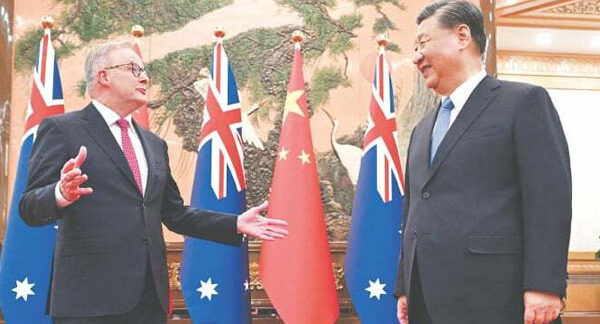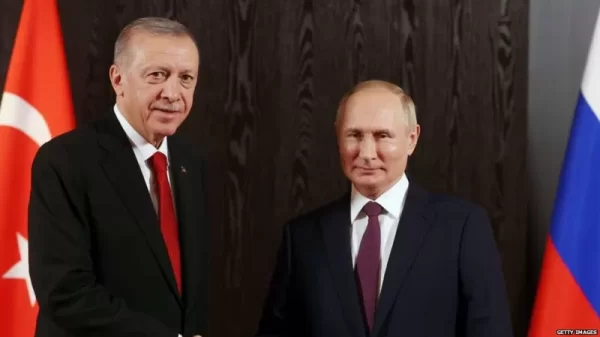Pakistan-Taliban tension increased, six Pakistanis were killed in the firing
Six Pakistani citizens were killed and 17 others were injured in the firing between Pakistan and Afghanistan on the Balochistan-Kandahar border on Sunday afternoon.
In the statement released after this attack, the Pakistani army has accused the Afghan security forces of attacking without provocation.
The Pakistani army has also said that the Afghan security forces used artillery and ammunition in this attack, after which Pakistan border security forces retaliated.
According to the news agency Reuters, Kandahar Police Spokesman Hafiz Saber has said that an Afghan soldier was also killed in this attack and ten other people were injured, including three civilians.
Pakistan’s Prime Minister Shehbaz Sharif tweeted, “Many Pakistanis have been martyred in Chaman and more than a dozen people have been injured due to the unnecessary firing of the Afghan Border Force. This is unfortunate and I strongly condemn it. The interim government of Afghanistan should ensure that such an incident does not happen again.
Noor Ahmed, an official of the Afghan government, has said that after the talks between the two sides, the situation at the incident site has returned to normal.
Why did the shooting happen?
According to Reuters, sources related to the security forces of Afghanistan have said that the clash between the two sides started when the Pakistani security forces prevented the Afghan security personnel from building a new check post on the border in the Afghan territory.
At the same time, Chaman district police officer Abdullah Kasi has told the Pakistani newspaper Dawn that the firing started between the two sides after a mortar shell fell in the Pakistani territory.
Chaman Chowki in Afghanistan’s border province of Kandahar is a trade and movement route between the two countries.
After this attack, the Pakistani government talked to the Afghan government and explained the seriousness of the matter. It has been demanded to take strict steps so that such incidents do not happen again.
But this is not the first occasion when a violent clash between Pakistan and Afghanistan has been witnessed in this region.
This road was closed for several days after a similar conflict last month. In that case, an armed Afghan man crossed the border and attacked the Pakistani security forces in which one Pakistani soldier was killed and two others were injured.
Along with this, eight people, including two children and three para-military soldiers, were injured in cross-border Afghan firing after a dispute arose over road construction in Kurram district of Khyber-Pakhtunkhwa province last month.
Indirect confrontation between the two parties
Apart from these direct conflicts, both sides are indirectly coming into conflict with each other.
Just 24 hours before the latest exchange of fire between the two countries, Pakistan has claimed that its security forces have found and killed four IS extremists near an Afghan village.
IS-K claimed responsibility for the attack on the Pakistani embassy in Kabul on December 2, in which embassy official Ubaydur Rehman Nizmani was targeted. Nizmani escaped unharmed in this attack but his personal security personnel were seriously injured.
Meanwhile, the government of Pakistan is facing new challenges from Tehreek-e-Taliban. It was the interim Taliban government of Afghanistan that started Pakistan’s talks with this group. It is called the Taliban of Pakistan.
TTP wants to run its rule in the tribal areas bordering Pakistan and Afghanistan. For this reason, he does not want the presence of Pakistan Army. And because of this, the army keeps clashing with him.
At the beginning of this month, TTP has announced the end of the ceasefire with the government after a long series of talks with this group started, stopped, and failed.
Along with this announcement, TTP has ordered its members to attack across the country.
After this, the danger of another bloody war between the army and the TTP in Pakistan has increased. Along with this, the threat of TTP attack on civilians has also increased. TTP has been attacking minorities, women and liberals in the country.
Pakistan-Afghanistan border dispute The border dispute between Pakistan and Afghanistan is not new. There is a 2600 km long border between the two countries, of which 90 percent of the border has been fenced by Pakistan.
The border separating Pakistan from Afghanistan is called the Durand Line. But Afghanistan does not accept this boundary.
Pakistan does not call it the Durand Line, but calls it an international border. He says that this border has gained international recognition.
The British government had drawn a 2640 km long border line with Afghanistan in 1893 to strengthen its control over the north-western parts of then India.
This agreement was signed between the then Foreign Secretary of British India Sir Mortimer Durand and Amir Abdur Rahman Khan in Kabul. But whoever rules Afghanistan, not everyone agrees on the Durand Line. No Afghan considers it an international border.
This is the perception of the Durand Line from King Amanullah in 1923 to the present government. After the birth of Pakistan in 1947, some Afghan rulers questioned the validity of the Durand Agreement.
Earlier this year, the border dispute between the two countries came to the fore when a top Taliban commander said he would not allow Pakistan to build a fence.
Taliban commander Maulvi Sanaullah Sangeen told Tolo News, “Pakistan did what it did before, but now we will not allow it. No fence will be allowed anymore.”
However, there is no clear stance on this issue from the central leadership of the Taliban.
But after the return of the Taliban in Afghanistan, there have been signs that the relations between the two countries have turned sour instead of sweet.
While Pakistan is among the first countries that formally recognized the Taliban government of Afghanistan.
But even after this, instead of deepening and strengthening the relations between the two countries, there is tension and tension.
What do diplomats say?
Meanwhile, it is being said that the Indian government seems to be getting the upper hand in the Taliban. Recently, a team of the Indian Embassy met the Urban Development Minister of the Taliban, Hemdullah Nomani. After this, there is hope that development projects that have been stalled since the Taliban’s return to power will resume.
Along with this, the leader of the Taliban has said that his government wants India to invest in Afghanistan.
At the same time, Abdul Basit, the ambassador of Pakistan in India, calls it a victory of Indian diplomacy.
Basit says, “India has always been against the Taliban. Not only that, dialogue with them has not been a part of India’s policy. But since August 15, there has been a kind of change. After establishing control over Kabul and Afghanistan in August, India held the presidency of the United Nations Security Council at that time.
And on August 30, India very skillfully passed a resolution 2593 in which it was said that we cannot recognize the Taliban until it brings a comprehensive government, in which all parties are represented. In this, the rights of women, their education etc. have been discussed. After this, a resolution 2615 was passed in January as well. In such a situation, India chose to take a stand against the Taliban. India closed its embassy first. Opened again. Two days ago, the news came that twenty development projects which were stopped after the arrival of the Taliban, are now starting again.
Now India has prepared its diplomacy so well that it is also maintaining contact with the Northern Alliance or the National Resistance Front. And India also became a part of the Herat Security Dialogue held in Tajikistan. In this way, he has started dialogue with the Taliban, keeping all his options open. In this way, which was believed to be the end of India’s interference in this region, India has removed itself from that situation. And the loss that India was supposed to suffer did not happen, so India’s Afghan policy seems to be working.”








